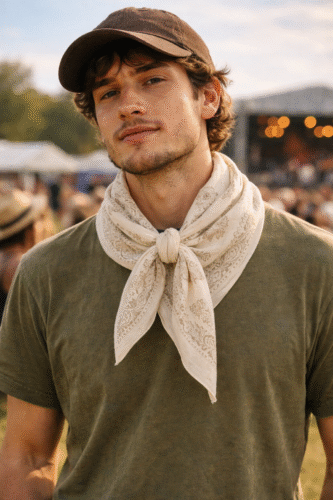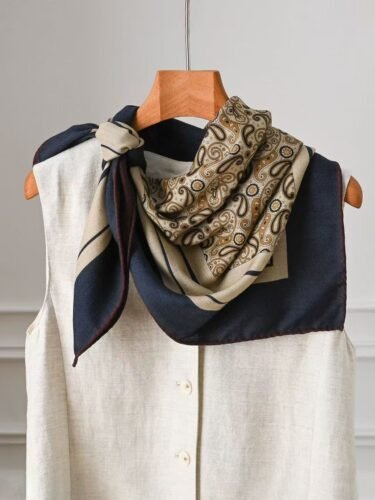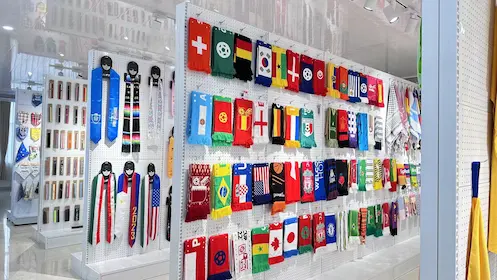جدول المحتويات
تبديللماذا تحتاج إلى قناع الوجه المناسب في البرد القارس
عندما تكون درجة الحرارة أعلى من 10 درجات تحت الصفر أو أقل، سيتعرض وجهك وأذنيك ورقبتك لخطر الرياح الباردة وقضمة الصقيع. لا يستغرق الأمر سوى بضع دقائق حتى يصبح الجلد المعرض للرياح الباردة القارصة خَدِرًا، مُحمرًا، ومتورمًا، أو حتى قضمة الصقيع. في هذه الحالة، يكفي الاعتماد على وشاح عادي، فهو لا يكفي. يكفي لتغطية الرقبة فقط، وسيُفقد الكثير من الحرارة بسرعة من الوجه وأعلى الرأس.
على النقيض من ذلك، فإن القناع الاحترافي المقاوم للبرد - أي قناع الوجه للبرد القارس - يتميز بتصميم متكامل، يغطي مناطق تبديد الحرارة الرئيسية الثلاث: الرأس والوجه والرقبة، ويستخدم مواد عزل حراري فعّالة لحبس الحرارة وتصريف الرطوبة، ما يضمن لك البقاء جافًا ودافئًا أثناء التزلج أو المشي لمسافات طويلة أو العمل في المناطق القطبية. ستشعر بوضوح باختلافه عن الأوشحة العادية، فهو يضمن راحتك وسلامتك في البيئات القاسية.
سوف يعلمك هذا الدليل كيفية اختيار البالاكلافا الأكثر ملاءمة للبرد الشديد وفقًا لدرجة الحرارة وكثافة النشاط والاحتياجات الشخصية، مما يساعدك على مقاومة البرد والاستمتاع بالهواء الطلق هذا الشتاء.
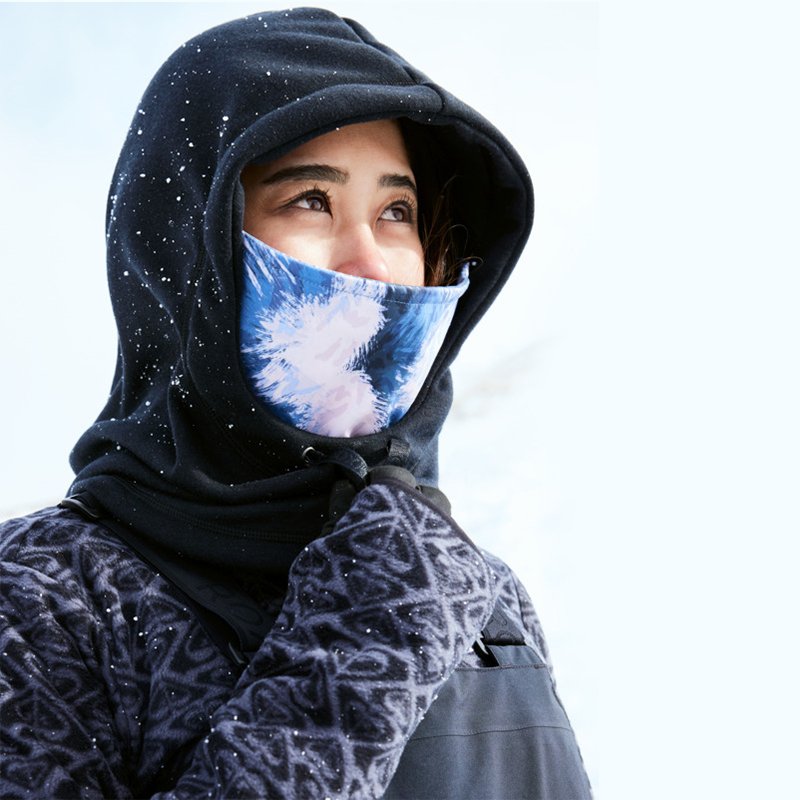
ما هو البالاكلافا؟
البالاكلافا قناعٌ مقاومٌ للبرد يُغطي الرأس والوجه والرقبة، ويُعرف أيضًا باسم "غطاء الوجه الكامل" أو "القناع المقاوم للرياح". يعود تصميمه إلى حرب القرم (معركة البالاكلافا) في القرن التاسع عشر، واستخدمه الجنود البريطانيون في الأصل لمقاومة البرد القارس في ساحات المعارك. مع مرور الوقت، توسّع نطاق استخدام هذه المعدات العملية تدريجيًا من المجال العسكري إلى الرياضات الخارجية مثل التزلج وتسلق الجبال وركوب الدراجات، لتصبح أداةً لا غنى عنها للتدفئة في الظروف الجوية القاسية.
الميزات الرئيسية التي يجب البحث عنها في البالاكلافا للبرد القارس
1. الأمور المادية
تُحدد المواد المختلفة قدرة البالاكلافا على الاحتفاظ بالدفء، والتهوية، وتجربة الاستخدام. إليك بعض أنواع المواد الشائعة عالية الجودة.
صوف ميرينو بالاكلافا
صوف الميرينو مثالي للأجواء شديدة البرودة. فهو دافئ بطبيعته ويحتفظ بالدفء حتى في حالة البلل. كما أنه قابل للتهوية ومضاد للبكتيريا، مما يجعله مناسبًا للارتداء طويل الأمد دون انبعاث روائح كريهة.
الصوف بالاكلافا
الصوف مادة خفيفة وناعمة، مناسبة للطقس البارد المعتدل أو الأنشطة الشاقة. مع ذلك، في الرياح القوية أو البرد القارس، لن يوفر الصوف حماية كافية من الرياح، لذا يُنصح باستخدامه مع طبقة إضافية مقاومة للرياح.
أقمشة مقاومة للرياح بالاكلافا
الأقمشة الاحترافية المقاومة للرياح، مثل Gore-Tex وWindstopper، قادرة على حجب الرياح الباردة بفعالية، وهي الخيار الأمثل في البيئات شديدة البرودة أو الرياح. تُستخدم عادةً في المعدات الخارجية عالية الأداء.
الخلطات الاصطناعية بالاكلافا
تتميز المواد الاصطناعية، مثل البوليستر والنايلون، بسرعة الجفاف والمتانة والأسعار المعقولة. وهي مناسبة للمستخدمين ذوي الميزانيات المحدودة والباحثين عن العملية.
2. تحقيق التوازن بين الدفء والتهوية: تجنب تراكم الرطوبة
في البيئات شديدة البرودة، قد يؤدي الدفء المفرط ونقص التهوية إلى تراكم الرطوبة الناتجة عن التنفس في القناع، مما قد يؤدي في النهاية إلى تكوين صقيع على الوجه أو النظارات الواقية، مما يؤثر على الراحة والسلامة.
تصميم البالاكلافا الموصى به: هيكل من القماش مزدوج الطبقة (مثل الطبقة الخارجية المقاومة للرياح + الطبقة الداخلية الماصة للرطوبة)
انتبه إلى التفاصيل الوظيفية: سواء كانت هناك فتحات عادم خاصة أو تصميم تهوية مقسمة
السيناريوهات القابلة للتطبيق: تتطلب الرياضات عالية الكثافة (التزلج، وتسلق الجبال) نفاذية هواء جيدة.
3. الملاءمة والمقاس: هل يناسب خوذتك؟
يجب أن يتناسب البالاكلافا الجيد مع محيط وجهك دون أن ينزلق أو يضيق، خاصة عند ارتداء خوذة أو ممارسة تمارين شاقة.
تصميم مرن للبالاكلافا: تأكد من أنه يمتد بدرجة كافية لاستيعاب أشكال الرأس المختلفة
توافق الخوذة: تحقق مما إذا كان النمط "متوافقًا مع الخوذة" لتجنب الحجم أو الضغط
التنوع الوظيفي: هل يمكن فصله إلى وشاح أو قبعة؟
4. التنوع: هل يمكن تحويله إلى وشاح أو قبعة؟
تم تصميم بعض أقنعة الوجه عالية الجودة بفتحات قابلة للتعديل أو أجزاء قابلة للإزالة، مما يجعلها مرنة للاستخدام في مجموعة متنوعة من المواقف
طرق متعددة للارتداء: تغطية الوجه بالكامل / كشف الفم فقط / مفتوح بالكامل كوشاح
مناسب لتغيرات درجات الحرارة المختلفة: من فترات شديدة البرودة إلى فترات أكثر دفئًا
مناسبة للسفر أو المغامرين في الهواء الطلق: قطعة واحدة لاستخدامات متعددة، توفر المساحة
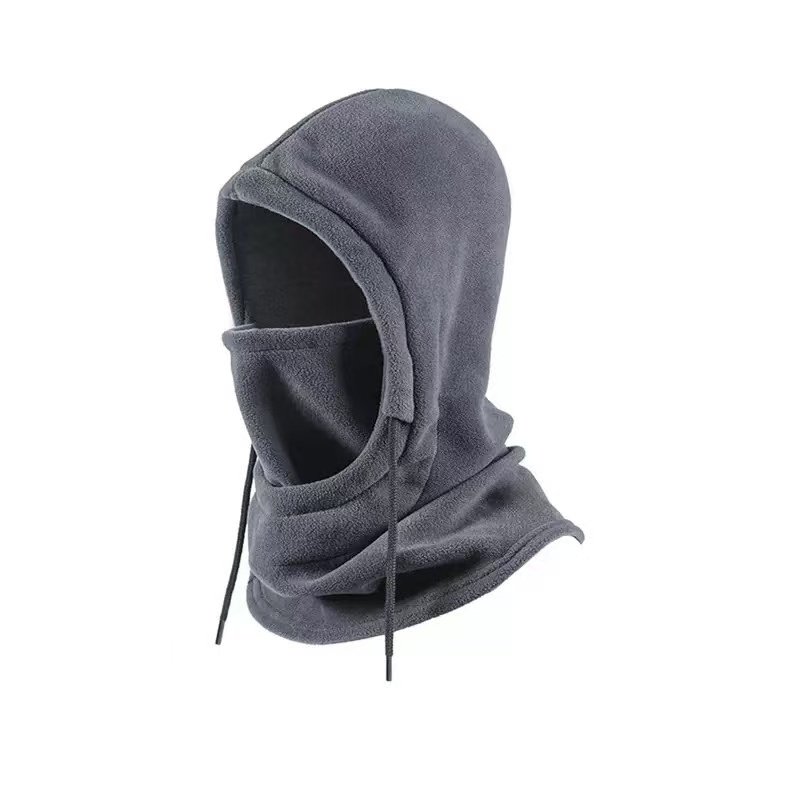
5. قابلية الغسل والمتانة: صُممت لتدوم طويلاً
بعد الاستخدام المتكرر، فإن ما إذا كان البالاكلافا سهل التنظيف، وما إذا كان سيتشوه أو يفقد دفئه هو معيار مهم لقياس جودته.
قابل للغسل في الغسالة: راجع تعليمات المنتج على الملصق. بعض موديلات الصوف تحتاج إلى الغسيل اليدوي.
مقاومة للرائحة: صوف الميرينو مضاد للبكتيريا بشكل طبيعي ومناسب للارتداء المتكرر والمستمر.
مقاومة التآكل: تحقق مما إذا كانت الخياطة ثابتة وما إذا كان القماش سهل التكتل أو الكسر.
6. الأسئلة الشائعة حول أقنعة الوجه للوقاية من البرد القارس
س1: هل يمكنني ارتداء قناع تحت الخوذة؟
ج: نعم، ابحث عن الموديلات ذات المقاس النحيف أو القابلة للتمدد.
س2: هل صوف الميرينو أفضل من المواد الاصطناعية؟
ج: يعتبر الميرينو أكثر قابلية للتهوية والدفء، ولكن المواد التركيبية أرخص وتجف بشكل أسرع.
س3: كيف يمكنني منع الضباب عند ارتداء قناع الوجه مع النظارات الواقية؟
أ: اختر واحدة مع مناطق التهوية أو خيارات التهوية.

